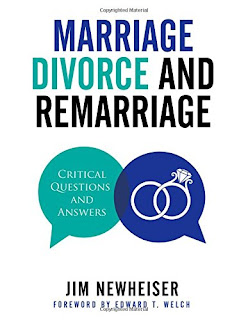Marriage, Divorce, and Remarriage by Jim Newheiser (Review)
One place that I found it to be lacking was his treatment of forgiveness. He seemed to equate trust and forgiveness. I would have loved for him to find more scriptural grounds for partial forgiveness. On page 251, he talks about full forgiveness. Is it okay to partially forgive?
Jim says,
If someone is not repentant (e.g., the guilty party continues to see the other man or woman), the innocent spouse is not obligated to fully forgive the person by taking him or her back and not using the right to divorce... When adultery is fully forgiven, the innocent spouse makes a decision to continue in the marriage relationship and forgo using the known sexual immorality in the future as grounds for divorce. This forgiveness should be specifically sought and granted. Once this decision has been made, the innocent spouse cannot change his or her mind and file for divorce later on.7 Forgiveness also implies fully entering into the commitments and responsibilities of marriage. p. 251This is what I have read in the Bible, Ephesians 4:32 "Be kind to one another, tenderhearted, forgiving one another, as God in Christ forgave you." Jesus said, in the Sermon on the Mount, "14 For if you forgive others their trespasses, your heavenly Father will also forgive you, 15 but if you do not forgive others their trespasses, neither will your Father forgive your trespasses" (Matthew 6:14-15). Where is there qualification for partial obedience? I don't see it. I sense that Jim was trying to give a quick answer and would do a better job with more time. The problem with a concept of partial forgiveness is that it seems to give the "victim" a way out of the biblical call to forgive.
Another point of confusion for me is the complete restoration of the marriage is equated to forgiveness. Can I not trust a person, yet forgive them? I would answer, yes. Consider the extreme cases of abuse and violence. Can offer a release of bitterness, anger, and relational debt yet maintain some boundaries? I am still working out this in my mind and understanding of scripture.
Are boundaries scriptural? As I sit here, I think boundaries are not just about protecting the victim; they also help the perpetrator. Boundaries can offer a middle ground to demonstrate repentance. They can protect a thief from temptation. They can provide soil for a disciple to grow. Paul says a new convert should not be quickly installed to lead (1 Timothy 3:6). If a city didn't receive Jesus's disciples, they were to shake the dust off their feet and move on (Matthew 10:14). A divisive man Paul says to warn twice and then if he keeps it up to have nothing to do with him (Titus 3:10). So I boundaries are scriptural.
The challenge for me is, do we restore the repentant believer to their previous place in the Body of Christ? Paul says in 2 Corinthians 2:-8 "6 For such a one, this punishment by the majority is enough, 7 so you should rather turn to forgive and comfort him, or he may be overwhelmed by excessive sorrow. 8 So I beg you to reaffirm your love for him." Would Paul put this man back on the eldership right away? Alternatively, if this man was in charge of children's ministry, would he place him back in that deacon role? My thought is that he can be thoroughly forgiven. However, there are relational and wisdom boundaries that can protect the church as well as the repentant member.
Overall, Jim's book is fantastic. It was 300 pages with great content and thought-provoking questions. The chapters move by, and I could not put it down.

.jpeg)


Comments
Post a Comment